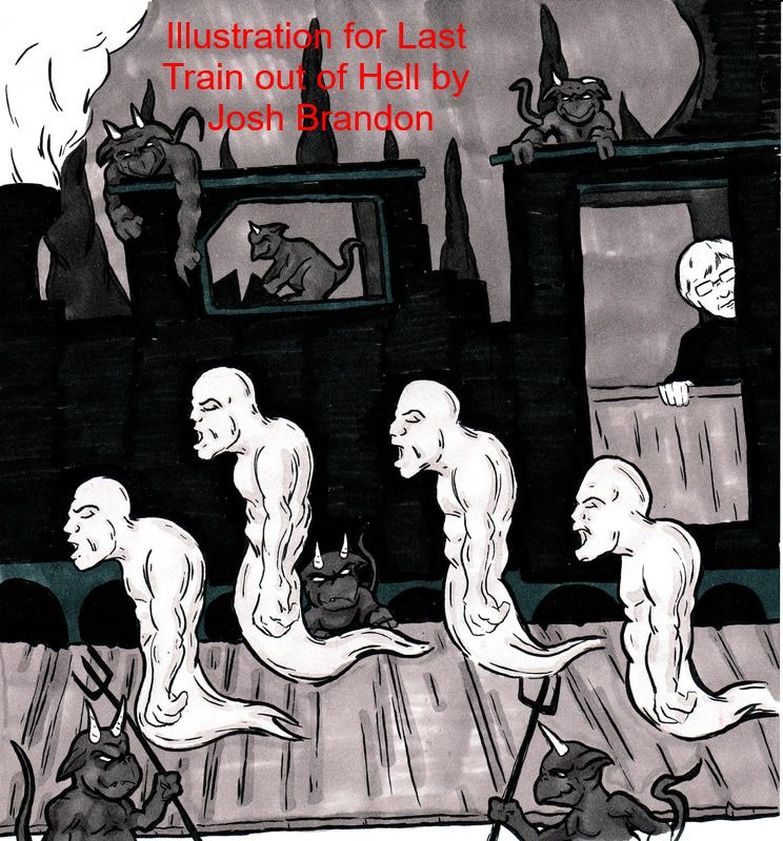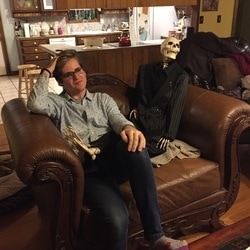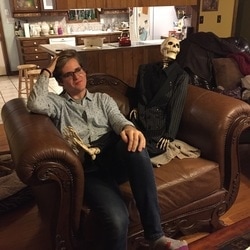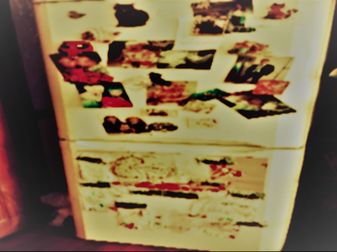Sacred Chickens
Menu
SACRED CHICKENS
 The Wise Man and the Fearful King by Uncle Morty Once upon a time, there was a kingdom by the sea. Some of the people who lived there were farmers, some were fishermen, some were merchants, some were craftsmen, and far up on the mountain in an old and rather worn down abbey, a group of men and women lived to study the old stories and tales of the kingdom. These were the wise people of the kingdom and they were called upon for advice in times of trouble. For many years, there had been no trouble in the kingdom. The fields were fertile and trade was good. The people were happy and prosperous and for the most part they behaved pretty decently towards one another and towards the people of the neighboring kingdoms. However, after many years the kingdom fell on hard times. The kingdom and all the kingdoms surrounding it experienced famine. To be honest, the famine was much more pronounced and serious in the surrounding kingdoms than it was in the kingdom by the sea. However, the people had become quite used to being happy and prosperous so even before things become very difficult they became afraid and angry. It wasn’t long before they were not getting along with each other very well. It turned out that they had been happy and for the most part decent because they were prosperous and not the other way around. Their fear made them start blaming each other. The merchants blamed the farmers for not planting extra crops in the good years. The farmers blamed the merchants because they said the prices had not been high enough for them to have planted extra in the good years. The artisans were angry at both the farmers and the merchants because obviously one or both of those groups had to be at fault, it certainly wasn’t the artisans. The fishers were beginning to hoard their fish instead of bringing them to market. All of the people in the kingdom by the sea blamed the neighboring kingdoms for not being able to feed their people and asking for grain and supplies and so on. Some people wanted to quit trading with the neighboring kingdoms altogether. This in its turn made the king very much afraid, because far back in the history of the kingdom, his great, great, great, great grandfather had been made king because the people had chased off another king after a famine. Now the king was not suffering at all because the people had to pay him tributes of money and food. He was actually mighty rich. He’d never been hungry a day in his life, and he really didn’t want to try it, as the people in the country who were hungry simply couldn’t shut up about how terrible it was, so he began to consider how he might continue to be a mighty king with a full table. He thought and thought and thought about it and he finally decided that the only thing to do was to be practical. There was not enough food for all the people. He would have to choose who would eat and who would not. He and his friends were quite fond of their banquets. It wouldn’t do to give those up. It made him a little sad, but facts were facts. He knew that it would be up to him to decide who would eat and who would not eat. Of course, he realized that those who weren’t chosen would not be very happy about the fact. It wouldn’t do to let them know they would not receive their share of the kingdom’s food until they were too weak and poor to do anything about it. He’d read his history carefully and he was fairly certain where that king long ago had gone wrong. He didn’t intend to make the same mistakes. After he’d decided, sadly and fearfully, what he must do, but before he had started to carry out his plans, one of his advisors came to him. “Sir,” said the advisor. “The people ask that you call on one of wise people. It is customary in times of trouble.” Now the king had already pretty well made up his mind what he was going to do and to whom he was going to do it, but in the meantime he thought it best to keep the people happy. After all, some of them were going to be quite unhappy soon enough. And he didn’t want the panic to set in until he had assumed control of the situation. So he made a great show of calling the wise man and he set up a large hall, with a throne for himself and enough room for many citizens to attend. He sent a messenger far up the mountain to the abbey. At the bottom of the mountain, the messenger blew his horn and waited. After a time, the abbess caused a basket to be let down (the only way up the cliffs to the abbey on the mountainside) and in it was a small, homely, bearded man. The man was dressed in plain white robes that were obviously quite old, but which had at least been cleaned and nicely pressed. The wise men and women did not receive a tribute from the people. They had to make do with a few scrawny goats and an arid mountain garden. They managed to grow a nice nearly wild grape for wine and this was all they had to trade. Now in the kingdom by the sea, the people had a very strange religion. Unlike many other countries, which conveniently had many gods for various purposes, these people believed that there was only one God and that this God not only built the universe but that he filled every nook and cranny of it. And strangest of all, they believed that this giant God, who was everywhere at once, had once paradoxically become small and stuffed himself into the body of a person and had lived in their very kingdom (yes, yes… I know…absurd…but it was what they believed.) Strangest of all, the people believed that the things that this unimaginably huge God had said and done when he was at his smallest were the most important things. And they based all their wisdom on thinking and acting as their God had done, not when he was big and important and causing earthquakes and imploding stars, but when he was a person just like them. This at least was the gist of what they were taught from the time they were very small. The people didn’t pay it too much mind. That’s what they had the Wise Ones for. The Wise Ones in the abbey spent all their time thinking about the stories of the Person God (and not so much time thinking about the Very Large God) and trying to put the ideas they might glean into practice as best they might for that was their purpose and duty. When one of them was called into the kingdom, which was almost always in times of trouble (for the people almost forgot they existed when times were good), he or she went and listened to the king and his advisors and then recounted the story they thought would be most helpful to the situation. When the wise man arrived he was led to the front of the assembly. The messenger had already told him why he had been called and he had thought about the best story to tell the people on his journey to the city. The king, who did not have high hopes for this performance, allowed the small man to come to the front of the assembly and speak. He supposed that the man might ask them all to make some sort of sacrifice or perform some sort of ritual. He thought he vaguely remembered such things from the stories he had heard. But the man said that he would simply recount a story that he thought might help. “Once upon a time,” he began, “God made himself into a person. Now the other people could tell that there was something a little different about him, he seemed very wise and kind to some of them, to some he seemed peculiarly annoying, and the rest he was at least interesting, so they followed him about. One day, he had a very large crowd following him.” “How many people,” someone called out from the crowd. “Oh, several thousand,” said George, for that was the wise man’s name. “The exact number is not important, but there were lots and lots of them. The crowd that followed him were not all of them the nicest people. Some had followed him that day because they actually wanted to learn something from him. Some were following him because other people were following him and it seemed like the thing to do. Some were following him because they were sick, and there were rumors that he healed people and cured blind people, and people with fevers, or other kinds of illnesses.” “He was magic!” someone yelled out from the crowd. “God is magic!” someone else yelled. “Well,” said George. “Not exactly. But I’m coming to that. Some of the people who followed him were following him because they hoped they might see something like a magic trick. I expect that didn’t please him too much. A few of them had followed him because they liked to complain about everything he said. But the point is that they had all followed him out to a desert place. It was late, and they were all hungry.” “Why didn’t they bring lunch?” someone asked. “That was their fault!” “Surely God would punish them for being stupid!” said one of the merchants who was looking out of the corner of his eye at the farmers. “I would think that would teach them a valuable lesson.” George smiled. “Interestingly he didn’t blame them at all. He was worried about them. He asked some of his closest friends if they might have something to feed everyone. But even his closest friends had somehow been caught off guard. They didn’t have anything either. “Tsk. Tsk,” said one of the farmers, “When I know I’m going to be out all day, I pack some boiled eggs and some of my wife’s good brown bread.” His wife nodded approvingly. “Well,” said George, with a shrug of his shoulders, “These people hadn’t thought of that. Come to that, the Person God hadn’t thought of it either. Or perhaps he had some purpose in not bringing food. Maybe he wanted to see what they would do. At any rate, the hour was late and the people were hungry. There were surely some of the people who were old or quite young and some might have been ill or weak. Perhaps they would have a hard time making it back out of the desert without food of some kind. So in his concern for all those hungry people, the Person God asked his friends to go and see if anyone in the crowd had food to share.” “Share?” asked the king from his throne, “Wasn’t he magic?” “Well, not magic per se…” George began. He looked around the room and back at the king and sighed. Consider the level of your audience, the abbess had told him. “The kind of magic that he used often required people to do something first. For instance, a blind man might get mud smeared on his eyes and be asked to go and wash it off or something like that. In this case, he wanted someone in the crowd to share some food.” The king shrugged. He would never have allowed someone to smear mud on his eyes. Ridiculous story. There was some grumbling in the room, and George could see that the people were becoming a little alarmed. He continued. “His friends found one little boy who had five small loaves of bread and a couple of fish. The little boy offered his food to the crowd and surprisingly when it was passed around, it was enough to feed everyone! The food that was shared was enough for everyone!” George looked around the audience, pleased with the story, certain that the crowd would see the point. From in the back of the crowd, someone laughed, “That’s most ridiculous thing I’ve ever heard. Ridiculous!” Someone else called out angrily, “No! God is magic! That’s the point of the story. We have to do something to get him to magic us some food!” Someone else called out, “Some of those were people who didn’t like him? Why would he feed them?” “Pure magic!” called out someone else. “That doesn’t do us a lick of good. Nobody here is magic!” The shouts and calls, until George settled the crowd. “Listen,” he said, “The point is that we have to do the things the Person God has asked us to do! Those of you who have food should be willing to share it. That’s the thing that makes the magic work!” George winced at the word magic, but he figured it was pointless to try to get them to understand anything more complicated. The crowd once again began shouting out their disapproval. “Why the king here has plenty of food! I saw it in the store houses on the way here! I’m sure he would be happy to share with everyone!” George said, waving his hands madly above the crowd. He was certain that the king, who indeed had stored up a lot of food, would understand his story. He also knew that it was a king’s job to feed his people. He was quite pleased to see how well prepared the king was. The crowd was too caught up in its internal uproar to hear him. But not so the king. The king’s face turned pale and then it turned as red as a strawberry. He whispered something to his guards and they gathered up George and ushered him into a small stone room at the back of the great hall and left him there behind a locked door. The crowd was so busy arguing they hadn’t taken notice of George’s abduction. The king followed them and saw that George was tucked safely away. He waited a few moments so that the crowd might think he’d been speaking to George, then he returned and stood and faced the crowd. With his great red cape and golden crown, he was much more imposing than poor George could hope to be in his threadbare robes and scraggly beard. The crowd looked up at him, relieved. The king was someone who said things they understood. They didn’t always like the things he said, but they understood them. And there was something comforting about the fact that he could simply make them do what he said anyway. Not so much to think about. The king stood for a moment, looking kingly, letting the people admire him. And then he cleared his throat and began to speak soothingly. “George has agreed that in our present circumstances, this policy of sharing will probably not be enough to release the magic we need to feed ourselves for the duration of the famine. And so he has been good enough to volunteer to be a sacrifice for us. It’s a little known fact that our ancestors used to sometimes sacrifice a person in times of drought or difficulty. And who better to appease our God than a wise man?” here the king paused to look sad. The people caught their breath collectively. It had been many, many ages ago since any such thing had been done. But they were beginning to be hungry. And they were afraid. Besides, no one had ever talked the king out of a single thing he’d wanted to do. They were silent, but I’m afraid that most of them were thinking better George than one of us. So the king commanded a very tall pyre to be built. On top of this he had his men place a stake with chains. He had certain herbs brought to be placed on the fire. He wanted the whole thing to look like an important ritual. He wasn’t quite sure what he was doing, but then neither were most of the people. He made certain that the crowds would be kept at enough distance so that they could not hear any more of George’s silly and pointless stories. And then he went into his rooms and prepared a fine speech about sacrifice and the great gifts that God would bestow on a people who would humbly sacrifice one of their few wise men and he put on his robes and his great gold crown with the rubies. By the time he had finished, morning had become dusk. He went out to the funeral pyre and gave his speech. After his fine speech, during which he managed a tear or two, (he really had no reason to dislike George and it did seem like rather a waste, since George was of one of the wise people who pressed out his wine for him each year) and then he commanded George be brought before him. Now George, had had no idea of any of this when he was hustled out of the room by the king’s men. The crowd had looked mighty riled up and for all he knew, the imprisonment might be for his own protection. Nevertheless, he was slightly bored and he began talking to the nervous young man who had been left in charge of him. No one had seen any need to put one of the king’s best men in charge of guarding the small and strange prophet. But what the king hadn’t counted on was that George had lived and breathed the stories for so long that they had become for him a sort of magic. He didn’t have to talk to the nervous young man for very long. By the time the guards came to take him away, he and the young man were gone more than half the way back to the abbey on a fine swift horse. The young man spoke to the abbess and after some contemplation, she caused the basket to be pulled up the cliffs. The young man was taken in by the abbess and in his turn, he married a wise woman and made wine and worked hard in the arid garden and learned their stories and sang their songs. As for the king, he had to substitute a baker for the wise man, and when the crowd saw that he was taking one of them, instead of someone they didn’t know so very well, they became even more fearful. They began to quietly grumble against him and by the third year of the famine, they had run him out of the kingdom and replaced him with the baker’s son.
0 Comments
 Here's a list of stories Julie Carpenter has published at Fiction on the Web, with links. Just in case you need to catch up. Father Dingle, Some Mice, and the Portal to Hell The Giraffe Story The Bite The Last Train out of Hell  Children of Eden by Joey Graceffa Review by Jarad Johnson Children of Eden tells the story of Rowan, a second child in a dystopian society where couples can only can have one, due to strict population control. However, instead of aborting her, her parents decided to keep and hide her for her entire life, even though they are high ranking government officials. She is now an outlaw, and if discovered, marked for death. She can never go to school, make friends, or have any typical social interactions. After sixteen years, encouraged by restlessness and desperation, Rowan decides to venture out into the city. However, what starts out as an exotic adventure soon turns to tragedy. Rowan is now an illegal, hunted by the government. Outside of Eden, the Earth is long dead. All animals and most plants have been destroyed and turned into a vast desert wasteland, through a man-made catastrophe. Centuries ago, scientist Aaron Al-Baz saved a pocket of civilization, by creating the Eco-Panopticon, a massive computer program which harvested all of the Earths technology and used it to save a select few members of humanity. Humans will wait thousands of years until the EcoPan heals the world. This novel by Youtube sensation Joey Graceffa keeps the reader guessing and engaged until the very last page. Through captivating storytelling, the author takes the reader on the fascinating journey of Rowan, an illegal second child. Seeing her experience social interaction and the world outside of her home for the first time was a very interesting read. The people of Eden themselves are fascinating, from the sect that believes that they are actually animals and not humans, and modifies their bodies to reflect this, the inner city elite with their garish and bright clothing, to the outer city citizens who are trapped in poverty and low paying employment. Through it all, we see Rowan fighting for her life and the lives of those like her with a rebel militia with intentions of overthrowing the government. Reminiscent of the Hunger Games and Divergent, but very unique at the same time, Children of Eden is a must read for fans of the dystopian genre. As enjoyable as the plot of the book itself is, it also bears a strong message behind that about the environment. These people are living in a world where humans have destroyed the environment, and it is probable that the author was speaking on the current and controversial issue of climate change, in that he is giving us his idea of how far our destruction of the Earth will go. He describes a vast wasteland, ravaged by nuclear war and climactic disaster. It is chilling to think that climate change might go so far, but it may be a distinct possibility. The book is both an enjoyable and captivating narrative, and also a cautionary tale, urging us to take better care of our planet.  Jarad attends Middle Tennessee State University, loves tea, and tries to spend every spare second reading. Jarad is majoring in English. Bless his heart! Let's all light a candle for him and send him happy thoughts! Do you ever find yourself asking WHY? No? Well, perhaps you should. Let me introduce myself. I’m Charlie Fish, a writer of short stories and screenplays, and editor of Fiction on the Web, the longest-running short stories website on the Internet. My stories have been published in several countries and inspired dozens of short film adaptations. OK. That introduction is great, but it’s a little dry, isn’t it? So, let me try again. I’m Charlie Fish. I love stories that make me giggle (CLAM$ by Jeff Alphin), or sob (One Oh for Tillie by Tom Sheehan), or have nightmares (Stone by Matthew Kneale) – but above all I love stories that make me think. My proudest moments have been when my stories have evoked a visceral response. Like when someone told me Baggio's Story "changed me a little bit. Maybe a lot." Or "Killing Mildred made me laugh and then broke my heart." THAT's why I write. That’s a better introduction, I think. The difference is that the first introduction focused on WHAT, the second on WHY. You can probably have a whole career as an author without really examining WHY you write. But these days self-publishing and self-promotion is all the rage, so you’re going to have to be more than just a writer. You must make a brand of yourself – SELL yourself – whether it be on Smashwords, or on Patreon, or to an agent. And to do that, WHY is a profoundly useful tool. Being a writer often means living in a constant state of doubt and uncertainty. Is this novel worthy? Which agent or journal should I submit to? Is self publishing a good idea? Will I ever be able to write something as good as X? Will Y seem horribly passé by the time it’s finished? Am I just making a giant fool of myself? These are difficult questions. Questions that, if you’re not careful, will leave you with a trail of unfinished pieces on your hard disk, or trick you into writing what you think people want to hear rather than something that comes from you. But if you can answer WHY you write, the rest of the answers become easy. More than that, it will suddenly become easier to find your audience. Everything flows from WHY. So WHY do you write?
If you say “I write space operas,” that’s not enough. People will read Asimov or Niven or Simmons or Clarke instead. But if you say “The most precious thing in life to me is that precipitous sense of wonder you get from great science fiction – I write to create those moments,” that resonates much more deeply. People who feel the same way will reach out to you. To quote Simon Sinek, the goal is not to do business with everybody who needs what you have. The goal is to do business with people who believe what you believe. And once you know WHY, everything else falls into place. Like, how should I promote myself? Well, if you write because your aunt was married to a spy and you think someone should tell her story, start with that. Tweet a video interview with her. Share your research notes. Or, if you write to make people laugh, start a joke-a-day blog. Offer joke rewards for patrons. By understanding WHY you write, you will naturally create a cohesive product that like-minded people will be compelled to buy into. Now, here’s a secret. There’s a wonderful side effect to knowing WHY you write. It gives you AUTHORITY. As a writer, you may not realize it, but you are already an expert in authority. That’s why you’re called an AUTHOR. The world in your stories, whether it’s fiction or fact, slasher horror or vampire erotica, is how it is because you say it is. You have the ultimate authority to create the world and direct the reader through it however you see fit. Take this famous first line: “It is a truth universally acknowledged, that a single man in possession of a good fortune, must be in want of a wife.” THAT’s authority. The author is guiding us through the world as she wants us to see it. We go along with it because she tells us to. But exercising authority in your stories is different to having authority in the real world. You can write amazing stuff, but if someone asks you what you’ve written and you reply with hesitation and uncertainty they won’t be compelled to read. If you reply with authority, they will go along with you. Knowing WHY you write gives you that real-world authority. It gives you confidence, purpose, brings people along with you. All the ingredients of authority. If you say, “I write to make people laugh,” it becomes a self-fulfilling prophecy. People will laugh because you’ve told them to. So, what about me, Charlie Fish? Why do I write? Why do I run a short stories website? Why do I use Patreon? Why am I here? For me, the answer to all of the above is the same. To connect with people. To share with people the things inside me, the things I feel, the things I love. _________________________________ Visit Charlie Fish's FICTION on the WEB www.fictionontheweb.co.uk  Charlie Fish is a popular short story writer and screenwriter. His short stories have been published in several countries and inspired dozens of short film adaptations. Since 1996, he has edited www.fictionontheweb.co.uk, the longest-running short story site on the web. He was born in Mount Kisco, New York in 1980; and now lives in south London with his wife and daughters. You can contact me at [email protected], and you can follow me on Twitter @fishcharlie.
 The Alienation of Courtney Hoffman by Brady G. Stefani Review by Jarad Johnson What would you do if everyone in your life thought you were insane? Courtney doesn’t have to imagine. It’s her reality. It has been ever since her grandfather tattooed a strange symbol on her rib cage and tried to drown her in a bathtub when she was seven. He claimed that he was being visited by aliens, but of course no one believed him. Now, as a fifteen year old, Courtney is having the same visions in her dreams; however, the aliens reveal to her that they had formed an alliance with her grandfather, and that it is now passed onto her. When her mother discovers this, she has Courtney committed. While hospitalized, Courtney makes friends, but even friendships come with the risk of making her feel insane. Her journey of self discovery begins. As the book unfolds, Courtney begins to feel that she and her friends may have the fate of the universe resting in their hands. Is it true or is Courtney losing touch with reality? This book was not what I expected it to be, but in the best possible way. I can wholeheartedly recommend it. The fact that the main character does not always have a firm grasp on her reality keeps the tale suspenseful. The reader’s attention is riveted not only on plot points but on the shifting perspective of the main character. This adds a level of literary sophistication that is unusual for YA literature. Along with Courtney, the reader must question the existence of everything in Courtney’s reality. The author does not hand out easy answers and the reader must do some thoughtful work while enjoying the story. In the end, this novel grabbed my attention from the first chapter to the last. I loved the element of the unknown, and how the reader got a look inside the life of someone who was thought to be mentally ill. It was an enjoyable read, and I look forward to more from Courtney Hoffman.  Jarad attends Middle Tennessee State University, loves tea, and tries to spend every spare second reading. Jarad is majoring in English. Bless his heart! Let's all light a candle for him and send him happy thoughts! |

Click Photo above to buy ebook or paperback from Amazon.
Here's the link to Barnes and Noble Or order through your favorite independent bookstore! Categories
All
|





 RSS Feed
RSS Feed